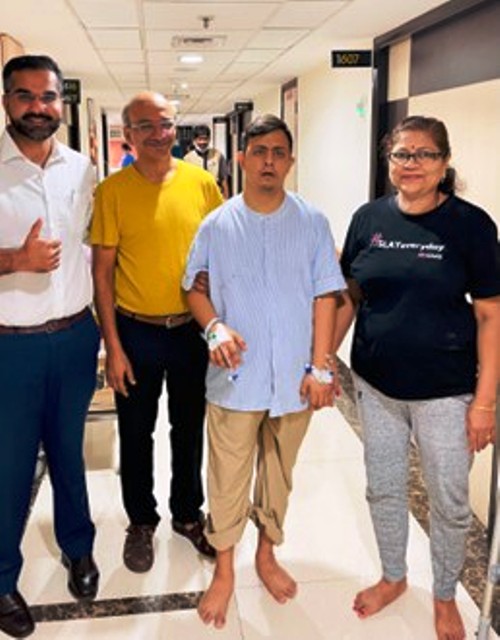New Delhi, August 21, 2023: The COVID-19 pandemic has cast an unprecedented shadow over the world, disrupting lives and healthcare systems in ways we never imagined. While the primary focus has been on battling the virus itself, an unexpected aftermath has been quietly emerging in the field of orthopedics. A concerning surge in cases of Avascular Necrosis (AVN) of the femoral head has been observed across India, drawing attention to the complex interplay between the pandemic and its impact on bone health.
Avascular Necrosis, often referred to as ‘osteonecrosis,’ is a debilitating condition that occurs when there is inadequate blood supply to the bone, leading to tissue death. The femoral head, a vital component of the hip joint, is particularly vulnerable to AVN. This condition can cause excruciating pain, joint dysfunction, and ultimately necessitate surgical intervention. Historically, AVN cases have been sporadic, often linked to trauma or chronic medical conditions. However, a concerning pattern has emerged in the post-COVID era.
Several factors contribute to the increased incidence of AVN in India after the COVID pandemic. The prolonged periods of immobility and decreased physical activity during lockdowns have been a significant contributing factor. Coupled with the prevailing anxiety and stress, many individuals have adopted sedentary lifestyles, inadvertently impacting their bone health. Furthermore, disruptions in regular healthcare services have delayed diagnosis and treatment, exacerbating the progression of AVN in many cases.
An intriguing case that sheds light on the unique challenges faced by patients during this time is that of a young individual with Down Syndrome who required a Total Hip Replacement (THR). Down Syndrome, a genetic disorder, presents its own set of challenges for medical care. Traditional THR surgeries often involve post-operative hip precautions, which can be particularly challenging for patients with Down Syndrome due to cognitive and physical limitations. To address this, a novel approach – the Direct Anterior Approach was employed at Wockhardt Hospital, Mumbai Central by Dr. Supreet Bajwa.
The Direct Anterior Approach is a minimally invasive surgical technique that allows access to the hip joint without detaching muscles or tendons. This innovative approach significantly reduces the risk of dislocation and eliminates the need for post-operative hip precautions. In the case of the patient (Minesh Goglani, 32) with Down Syndrome, this approach proved to be a game-changer. The patient’s recovery was smoother, and the rehabilitation process was more manageable, highlighting the potential benefits of embracing advanced surgical techniques tailored to individual needs.
As we navigate the complex landscape of post-COVID healthcare, it is imperative that we remain vigilant about the unintended consequences that may emerge. The surge in AVN cases underscores the importance of maintaining an active lifestyle, seeking prompt medical attention, and embracing advancements in medical care. While the pandemic has posed unprecedented challenges, it has also accelerated innovation and adaptation within the medical field, as seen in the case of the Direct Anterior Approach.
In conclusion, the increased incidence of Avascular Necrosis of the femoral head in India after the COVID pandemic serves as a poignant reminder of the far-reaching impacts of the crisis. By learning from individual cases, like the patient with Down Syndrome, and harnessing the power of cutting-edge surgical techniques, we can usher in a new era of orthopedic care that is more patient-centered and resilient in the face of unexpected challenges.
Corporate Comm India (CCI Newswire)























